Written by Barbara Fox


Feeding the hungry — that doesn’t sound like a fun topic, one that you would like to contemplate over a meal. But at the United Methodist Men’s breakfast at our church on October 14, Phyllis Stoolmacher quoted poignant stats like a politician, dispensed the folk wisdom with the aplomb of a culinary Dr. Ruth, and inspired like a preacher.
Stoolmacher has been the forever-director of the 25-year- old Mercer Street Friends Food Bank, which distributes 50,000 pounds of food a week to some 60 organizations to help feed 25,000 people in Mercer County who don’t have access to enough healthy food.
Some at the breakfast had just taken the food stamp challenge, to live for a week on the meagre amount provided by what is now called the Supplemental Nutrition Assistance Program (SNAP). And the 25-year-old food bank partners with the Trenton Area Soup Kitchen which in turns partners with our church to deliver a weekly Wednesday meal at the Cornerstone Community Kitchen.
I learned new facts and confirmed what I already knew. Federal contribution of commodities has been cut by two-thirds. A family of four can qualify for SNAP if the household income is less than $23,500, and this number does not account for the high cost of living in Mercer County. “It’s not a welfare program,” says Stoolmacher, “and we send our people out into the community with laptops to help people qualify.” Nutrition dollars come on a debit card so nobody can tell whether someone is swiping a credit card or the SNAP card. People stay on SNAP for an average of 9 months.
Restaurants can’t donate because of health issues. Supermarkets do donate, but not prepared food. The state provides funds to buy Jersey Fresh fruits and vegetables. Children who would otherwise go hungry on weekends get sent home with a backpack of easy-to-prepare microwavable meals. Simple recipes go into regular bags of groceries.
It’s best to give dollars rather than canned goods because the food bank can buy in bulk. “You would be surprised at what comes from food drives,” she said wryly, “how much cranberry sauce we get at Thanksgiving and how much matzoh we get in April. Who likes matzoh? I want tuna fish! Give me tuna fish and I am a happy camper.”
What else can we do? Realize that someone you know may be “nutritionally challenged.” Encourage somebody who is looking for work, maybe they’ve run out of unemployment benefits, to sign up for the SNAP program. Or bring them to our Cornerstone Community Kitchen on Wednesdays, from 5 to 6:30 p.m. Nobody knows the difference between the people who come for nutrition or those who come for conversation and companionship. There’s plenty of food on the plates, and there are flowers on the tables.
Some of that food found its way to Princeton via Stoolmacher. She won’t countenance empty or unhealthy calories — not soda, not Gatorade, not ramen noodles, not sweet cereal. Besides tuna fish, her most coveted item is shelf stable milk-in-a-box. “It tastes like real milk.”
At the next United Methodist Men’s breakfast, Sunday, November 11 at 8 a.m., PUMC church member Ed Felten will be the speaker. Reservations at office@princetonumc.com, $5.00.
A version of this post was published on the Princeton Comment blog
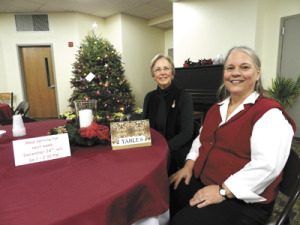 West Windsor Plainsboro News, the biweekly paper, celebrated Cornerstone Community Kitchen volunteers Annette Ransom (left in this WWP photo), Judy Miller (on the right) and Chris Orsini (pictured below, in action, wrapping take-home meals).
West Windsor Plainsboro News, the biweekly paper, celebrated Cornerstone Community Kitchen volunteers Annette Ransom (left in this WWP photo), Judy Miller (on the right) and Chris Orsini (pictured below, in action, wrapping take-home meals).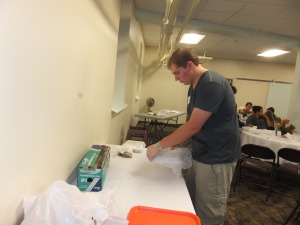 Thanks to all the volunteers who help Cornerstone Community Kitchen, to partner with TASK to serve meals every Wednesday since June 6, 2012. This year, it will offer its New Year’s Eve meal at a different time — 1 to 2:30 p.m.
Thanks to all the volunteers who help Cornerstone Community Kitchen, to partner with TASK to serve meals every Wednesday since June 6, 2012. This year, it will offer its New Year’s Eve meal at a different time — 1 to 2:30 p.m.
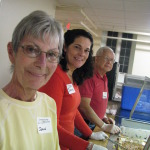 Cornerstone Community Kitchen celebrates its third Christmas, its first in the new Fellowship Hall. We serve every Wednesday, no matter what ! But on Christmas Eve and New Year’s Eve the meal will be 1 to 2:30 p.m. (instead of the normal 5 to 6:30 p.m.
Cornerstone Community Kitchen celebrates its third Christmas, its first in the new Fellowship Hall. We serve every Wednesday, no matter what ! But on Christmas Eve and New Year’s Eve the meal will be 1 to 2:30 p.m. (instead of the normal 5 to 6:30 p.m.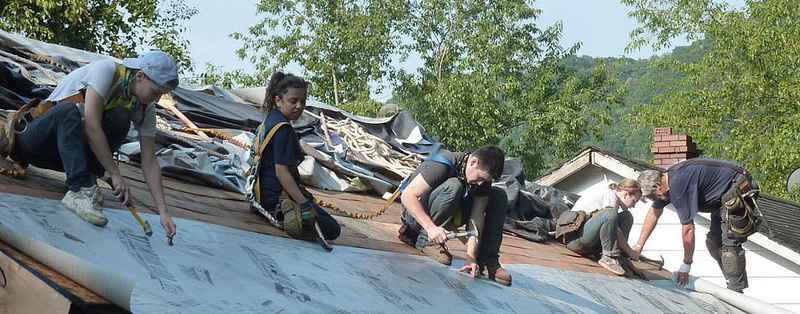
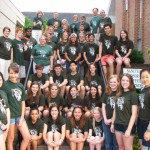
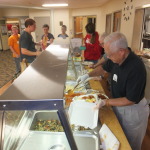 A short-term community service project, available to youth, could be with the Cornerstone Community Kitchen which offers a free and nutritious meal every week, even on holidays. Volunteers from the church and community help prepare and serve the meal. In partnership with the
A short-term community service project, available to youth, could be with the Cornerstone Community Kitchen which offers a free and nutritious meal every week, even on holidays. Volunteers from the church and community help prepare and serve the meal. In partnership with the 
